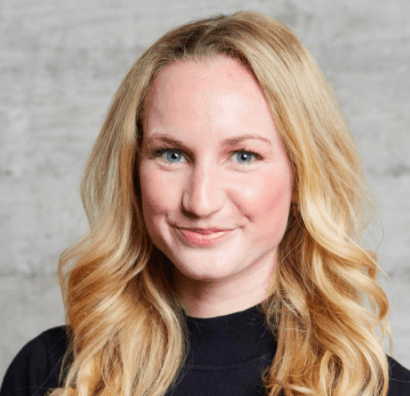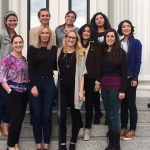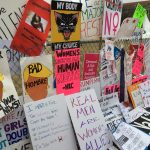
On My First Year Of Grad School

Jessica Lindquist, M.A., Public Affairs ’18
Last July I left my cushy job as an executive assistant at a financial technology company in Mid-Market to try something scary and exciting: graduate school. I had been accepted into the Master of Public Affairs program at the University of San Francisco. At my core, I knew it was time to take some risks and pursue the public policy career I had always dreamed about.
The first week of orientation was a whirlwind and admittedly I had a few moments of doubt, which I later realized is a classic stage of starting grad school. I found myself in a classroom of strangers feeling anxious about what the fall semester would bring. Yet, after a few weeks into the program, I was pleasantly surprised by how quickly I had adjusted to back to student life.
My favorite class of the semester was Applied American Politics taught by Professor Brian Weiner. Our small seminar provided us the space to have intense discussions, applying classic political literature to current events. The 2016 presidential campaign was a subject that we covered substantially in class and Professor Weiner wanted to afford us the opportunity to campaign in Nevada, the closest swing state to California. With a lot of time and coordination on his part, Professor Weiner was able to secure enough funding for anyone in the class who wanted to make the trip to Reno.
On an October afternoon I boarded a Greyhound bus with five of my classmates to persuade Nevadans to vote for the Hillary Clinton. Over the course of the weekend we door knocked in wet weather and unabashedly phone banked strangers. Many of the voters we spoke to were still undecided and it was insightful to talk through some of their concerns about the two candidates. Aside from the incredible campaign experience, the trip also turned my five classmates into five close friends. We spent time talking politics late into the night, swapped stories from the past, and discussed our dreams for the future. The bonds I made during the trip became even stronger when we were back in class.
A few weeks later on election night I watched in horror as Ohio, Wisconsin and Pennsylvania turned red. I woke up November 9th puffy eyed and feeling absolutely distraught. My only solace was knowing that later in the day I would go to class and be able to commiserate with my fellow classmates, who I knew were equally devastated about the election results. Together we tried to process the fact that Donald Trump would become the forty-fifth president of our country. In the days and weeks that followed, my closest support group became my academic community .
Winter break provided an opportunity to reset and reflect. I had time to think about the direction I wanted to take my graduate career. Over the last semester I noticed I kept being drawn to policy topics that were related to how our financial system negatively impacted the lives of low-income consumers. I had a revelation that I wanted to focus on consumer financial protection policy. I finally had clarity about my policy interests, which gave me direction and purpose.
A few days before spring semester, I traveled to D.C. to attend the Women’s March. The day after the inauguration, I joined hundreds of thousands of people to protest the hateful and discriminatory values of the Trump Administration. The energy in the city was electric and as I marched alongside a few of my friends I began to feel resilient. I saw so many different walks of life join together in solidarity for a common cause. At the risk of sounding trite, it was one of most beautiful experiences I have had in my life and it made me feel recommitted to use my voice to stand up for justice and equality.
Spring semester felt different in several ways. I had more confidence as a student and I knew what level of effort was required to get the most out of my classes. The coursework was incredibly demanding and I spent even more time studying. However, each of my professors was incredibly supportive and made themselves available whenever I reached out to them with questions or guidance.
Urban Public Finance was a class that I looked forward to every single week. Ed Harrington was the San Francisco Controller for twenty years and he has an impressive level of knowledge about the inner workings of City Hall. He brought in many guest speakers from the City that spoke to our class on a range of topics including local budgets, economic development and municipal debt. Not only were the speakers experts in their field, they had an obvious deep commitment to public service. After discussing career prospects with Ed, I became very interested in working at City Hall in the future.
By the middle of the semester my cohort began looking for internships. Having a full coursework load, working part time, and trying to secure an internship placement all at the same time was daunting. However, my program made sure I felt supported throughout the entire process. Kevin Hickey, one of our faculty members, used his expansive network to connect me to my top choices. Our program manager, Kresten Froistad-Martin, provided coaching on how to navigate the interviews and assess what placements would be best suited for me. References from faculty like Ed Harrington and Professor Weiner helped me secure my top two choices for my summer internship: the Office of Financial Empowerment at City Hall and the California Reinvestment Coalition. The internship search highlighted to me the connections this program offers its students.
The last week of finals, I found myself in the same room as orientation with the group of strangers that over the course of year had become dear friends. As each of my classmates presented on a research question that they had spent weeks preparing for our Research Methods final, I was struck by how much we each had evolved as students of public policy. My cohort has a diverse set of policy interests, and I’m grateful that I’m able to learn from them about issues that are outside of my focus. Their passion for social change and commitment to challenge the status quo has motivated me to work harder so that I can become a compassionate policymaker.
People say graduate school is not what you expect, but it is everything you need. This insight has been true thus far in my own experience. In the pursuit of my graduate degree, I’ve deepened my knowledge of public policy, become more open to perspectives that differ from my own and feel a renewed sense of purpose. I’m incredibly grateful for the strong support of the McCarthy Center, my graduate program, the dedicated faculty and my inspiring cohort. I’m looking forward to what the next year brings.
- The ladies of my cohort
- Visiting All In Alameda
- Campaigning in Reno
- Women’s March in D.C.
- Phone banking in Reno
- Attending the Bank On Conference in D.C.
- Protest posters from the Women’s March
- Visiting the Public Policy Institute of California










